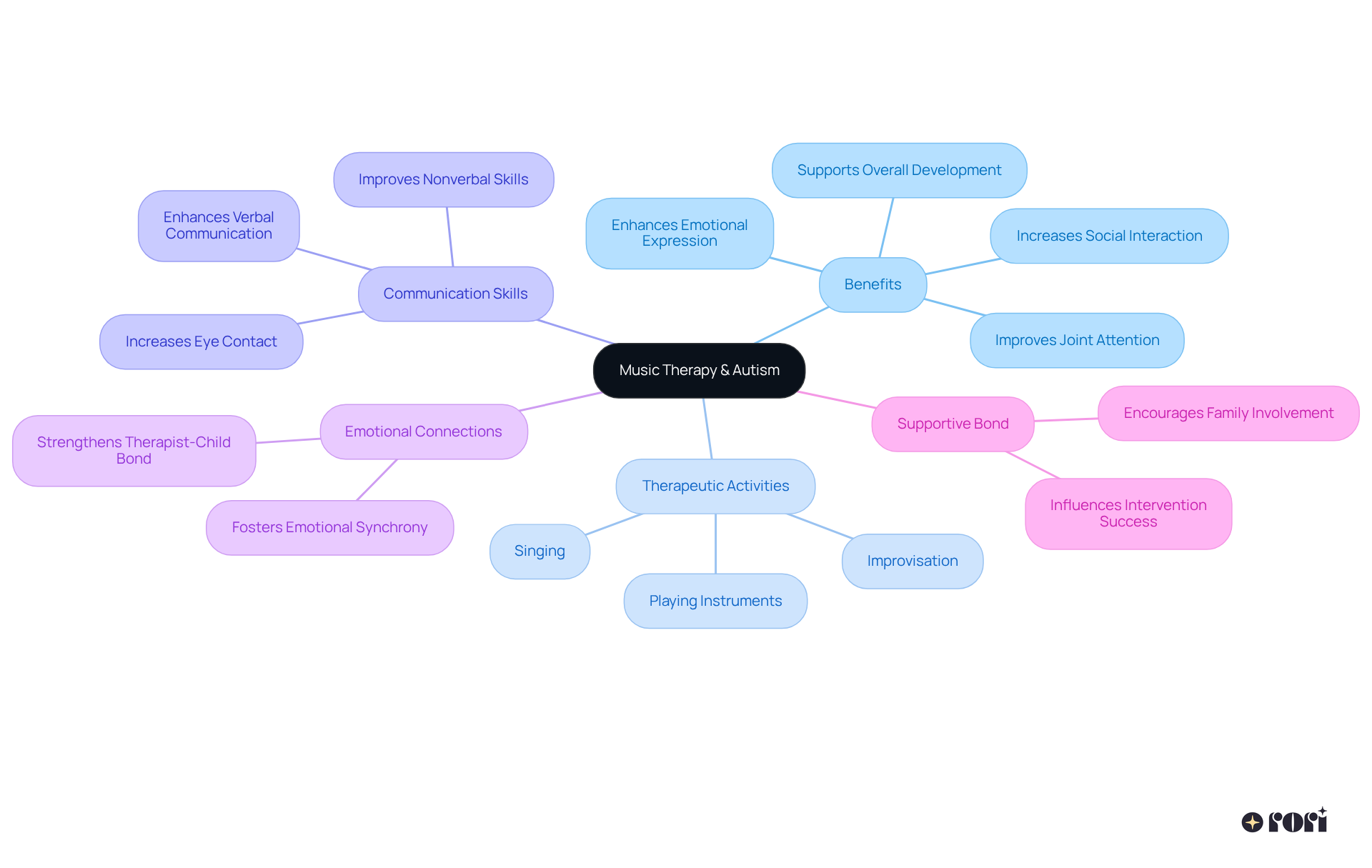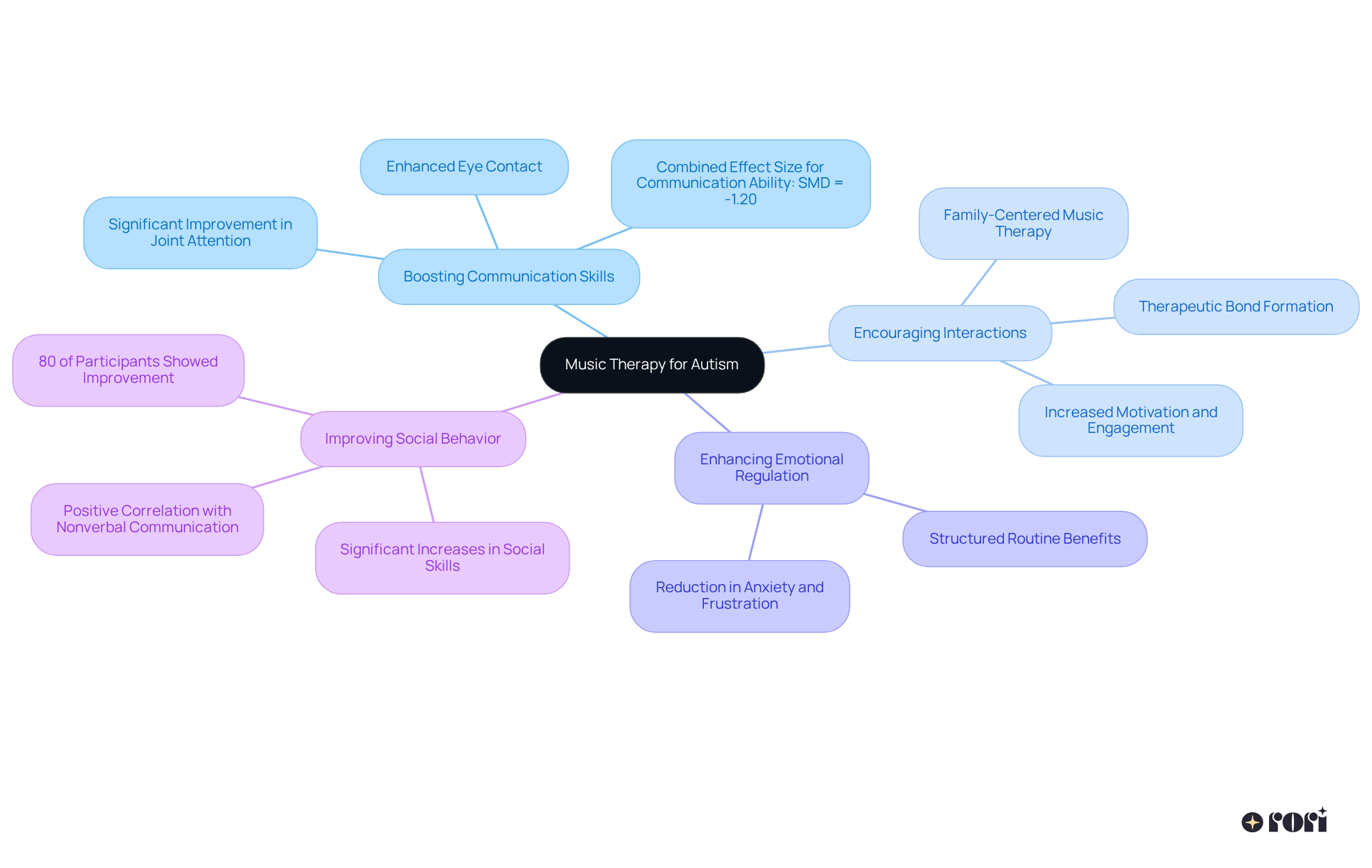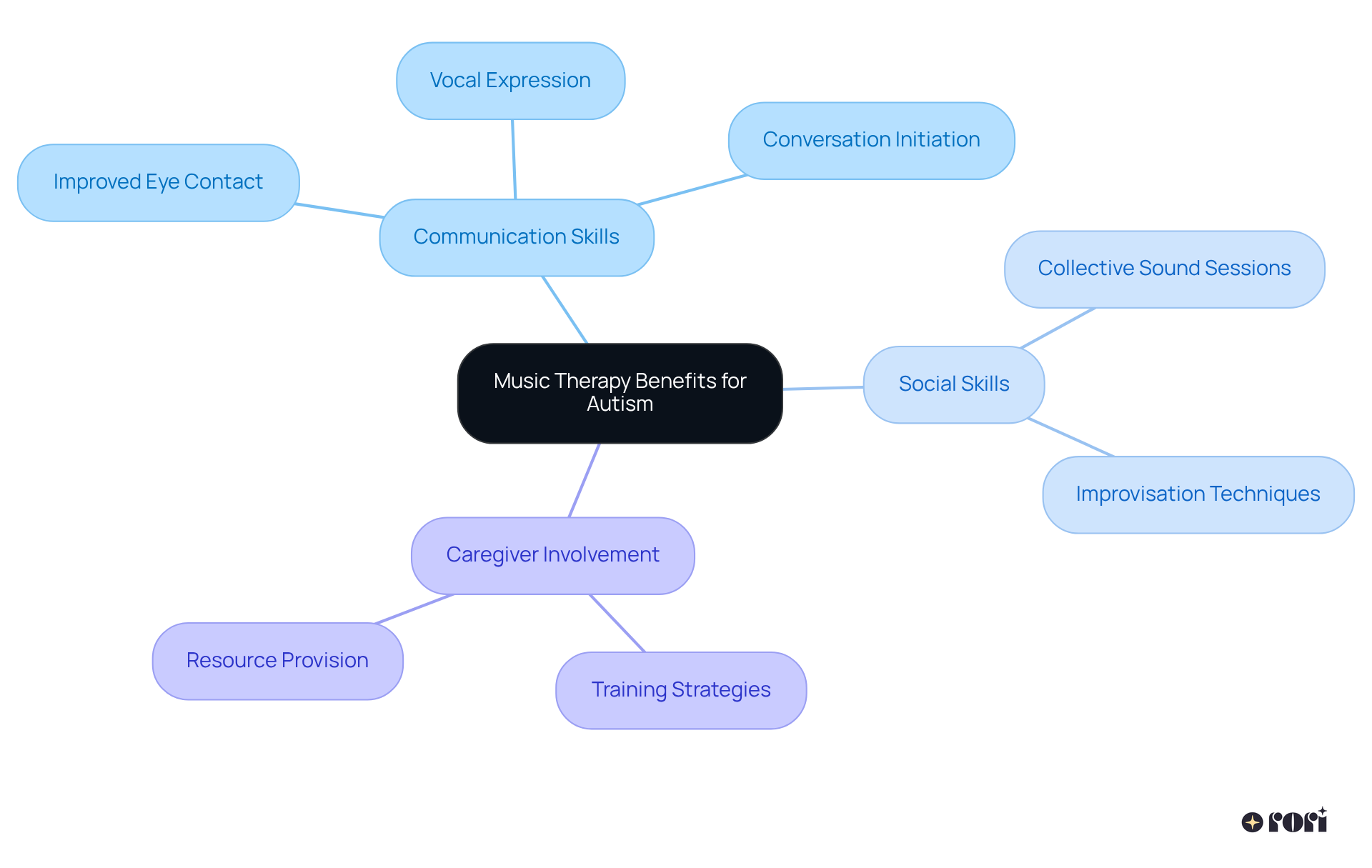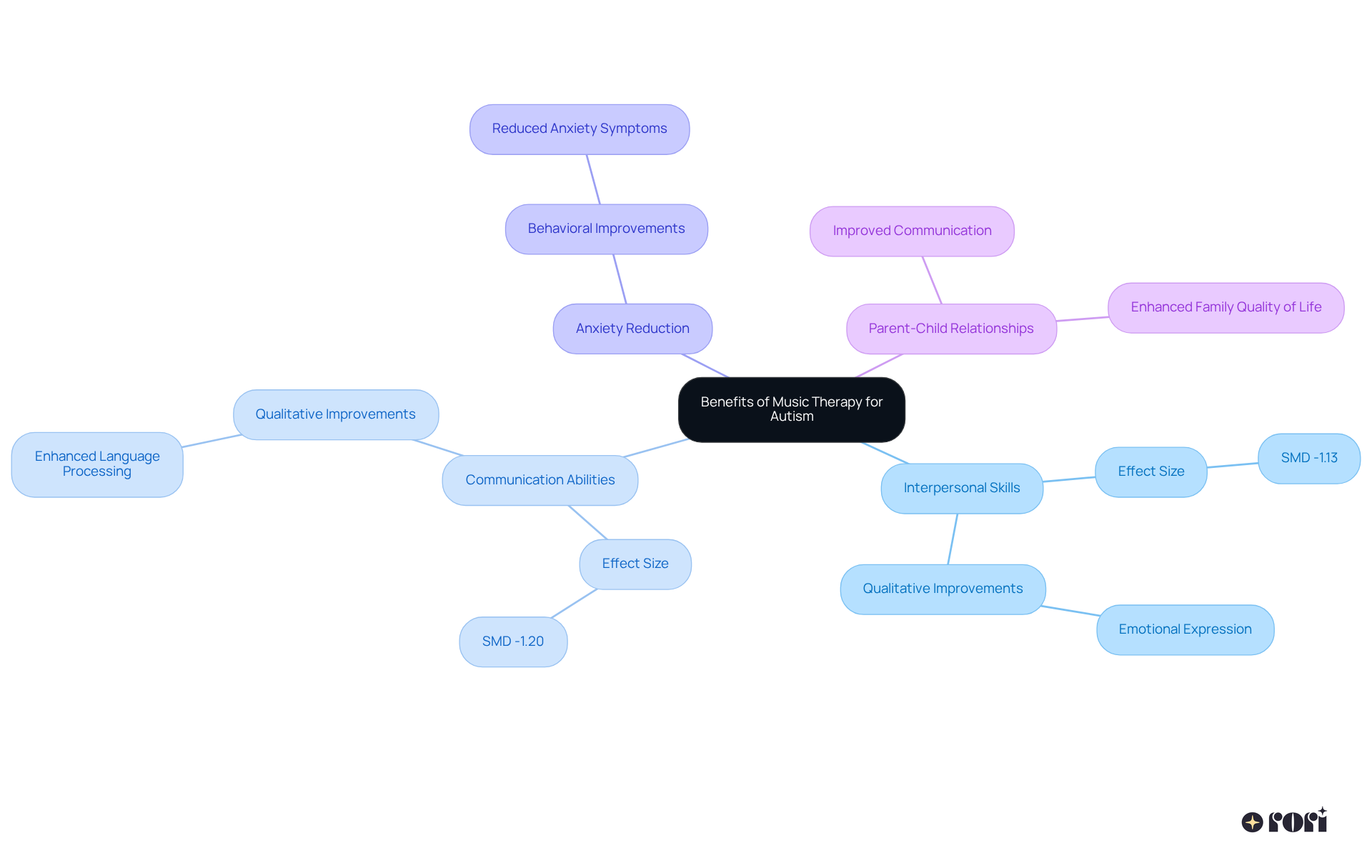Music therapy offers some wonderful benefits for children with autism! It can really help enhance their communication skills, foster emotional expression, and improve social interactions. Research shows that tailored musical activities lead to significant improvements in interpersonal skills and emotional regulation. Isn’t that amazing? This demonstrates how effective music therapy can be as a complementary intervention in autism care. Let’s explore this together and see how it can make a difference!
Music therapy shines as a beacon of hope for many children on the autism spectrum. It's a unique way to break down communication barriers and boost emotional expression. By harnessing the power of sound, this therapeutic practice creates engaging environments where children can truly thrive socially and emotionally.
Yet, even as its recognition grows, many parents wonder: what specific advantages does music therapy offer? How can it transform the lives of those it touches? Let’s explore this together!
Imagine a child who struggles to express their feelings. Music therapy can provide a safe space for them to communicate in ways they might not have thought possible. It’s about more than just playing notes; it’s about building connections and fostering joy.
As we delve into the benefits of music therapy, we'll uncover how it can be effectively integrated into broader treatment plans, creating a more comprehensive approach to support. We’re here to help you every step of the way!
Therapeutic sound treatment is a clinical and evidence-supported method that uses auditory interventions to achieve personalized healing goals. This approach is particularly relevant for autism care as it highlights the benefits of music therapy for autism by addressing the unique communication and interaction challenges faced by young individuals on the spectrum. By engaging children through sound, therapists create a welcoming environment that encourages emotional expression and social interaction.
Think about it: activities like singing, playing instruments, and improvisation are tailored to meet each child's specific needs. This highlights the versatility of sound intervention in supporting autism. Research shows that sound treatment can enhance interpersonal communication skills, improve joint attention, and strengthen emotional connections. Ultimately, this supports a child's overall development.
The supportive bond formed during sound treatment sessions is crucial, as it significantly influences the success of the intervention. Plus, as a budget-friendly and non-invasive supplementary approach, music intervention demonstrates the benefits of music therapy for autism by helping children navigate their social environments more effectively. Let’s explore this together and see how sound can make a difference in your child's journey!

The benefits of music therapy for autism include boosting communication skills, encouraging interactions, and enhancing emotional regulation for young individuals. Engaging in musical activities allows these young ones to express their emotions more effectively, helping to reduce anxiety and frustration. For example, a systematic review highlighted that children undergoing musical intervention showed remarkable improvements in joint attention and eye contact—key ingredients for social interaction. It’s heartening to see that studies reveal youngsters involved in musical interventions often display increased motivation and engagement, leading to more meaningful interactions with peers and caregivers.
At Rori Care, we empower caregivers with ABA principles and strategies to support their child's behavioral goals through active participation and data collection. This hands-on involvement creates a steady and encouraging atmosphere, boosting the effectiveness of interventions like sound therapy. The structured nature of sound therapy offers a calming routine, which is especially beneficial for youth with autism who thrive in consistent environments. A study involving 50 children aged 4 to 16 years found that 80% of participants showed significant improvements in social behavior, as shared by both parents and educators. Plus, sound therapy nurtures turn-taking and joint attention—essential elements of developing social skills. The therapeutic bond formed during these sessions is vital for enhancing communication skills, with specialists noting that sound can serve as a more approachable way for youngsters to connect when verbal communication is challenging. As Mathieu Pater aptly stated, sound provides a unique avenue for these young individuals to relate and communicate.
Overall, integrating auditory interventions into treatment plans showcases the benefits of music therapy for autism, as it not only supports the development of communication skills but also enriches the social experiences of children, paving the way for better emotional and social functioning. Additionally, Rori Care offers a variety of mental health support services, including group sessions, caregiver education, and program development, to further assist families on their journey. The combined effect size for communication ability enhancement was identified as SMD = -1.20 (95% CI = -1.45, -0.94), underscoring the effectiveness of music intervention in this area.
Let’s explore this together! We’re here to help you every step of the way!

The benefits of music therapy for autism include boosting communication and interpersonal skills in youngsters through a variety of interactive techniques. Think of rhythm and melody as unique ways for kids to express themselves without words. During collective sound sessions, led by skilled therapists, children learn to work together and interact, listening to one another and responding through sounds. These sessions not only build a sense of community but also improve verbal communication by incorporating songs that help with language development.
Studies show that kids involved in music therapy often display better eye contact, vocal expression, and the ability to start conversations—these are essential skills for effective communication. Techniques like improvisation and structured musical activities illustrate the benefits of music therapy for autism by enhancing social behaviors and making it a valuable tool in developing interpersonal skills for youth.
When combined with early intensive behavioral intervention (EIBI), the benefits of music therapy for autism can significantly improve learning, verbal, and social skills, offering a holistic approach to support individuals with autism. Plus, group sessions focused on social skills help enhance interactions and communication in a group setting, fostering better relationships and social competence.
This comprehensive approach not only benefits the children but also emphasizes the importance of training for caregivers. By providing parents with targeted strategies and resources, we can effectively support their children's development. Let’s explore this together and see how we can make a difference!

Comprehensive studies highlight the benefits of music therapy for autism and demonstrate how effective auditory treatment can be for children with autism. At Rori Care, our clinical leadership team truly values neurodiversity and is dedicated to helping children thrive. For example, a thorough meta-analysis revealed that the benefits of music therapy for autism included notable improvements in interpersonal skills and communication abilities among participants involved in musical sessions, boasting a medium to large effect size of 0.73. Even more impressively, the overall effect size for enhancing communication ability was SMD -1.20, while interpersonal skills saw an SMD -1.13.
Research published in credible journals consistently suggests that auditory interventions can help reduce anxiety and behavioral issues, showcasing the benefits of music therapy for autism in improving the overall quality of life for individuals with autism. One study even highlighted the benefits of music therapy for autism, indicating that children undergoing musical treatment showed significant advancements in interpersonal responsiveness and emotional expression compared to those who didn’t participate in such interventions. These findings underscore the essential role of incorporating sound-based interventions into autism treatment strategies, as the benefits of music therapy for autism not only enhance traditional therapies but also cater to the unique developmental needs of each child.
Moreover, sound treatment has been shown to positively impact parent-child relationships and improve communication, illustrating the benefits of music therapy for autism as a valuable addition to therapeutic approaches aimed at promoting social interaction and emotional wellness in children. At Rori Care, our expertise and compassionate approach empower families to overcome challenges and support child development through these innovative interventions.
If you're a parent interested in exploring the benefits of music therapy for autism, we invite you to reach out to Rori Care to learn more about our specialized programs. However, it’s important to note that results can vary, and there is significant heterogeneity in the studies. This highlights the need for further randomized controlled trials with rigorous methodologies to confirm these benefits. Let’s explore this together!

Music therapy shines as a wonderful way to support children with autism, opening up a unique path for communication and emotional expression. By tapping into the magic of sound, this evidence-based approach tackles the specific challenges that young individuals on the spectrum face, creating a nurturing space for social interaction and personal growth.
The article highlights the many benefits of music therapy, like better communication skills, improved emotional regulation, and increased social engagement. Through fun musical activities, children not only discover how to express themselves but also build essential interpersonal skills, leading to more meaningful interactions with peers and caregivers. Research consistently shows significant improvements in joint attention, eye contact, and overall social behavior, reinforcing the effectiveness of this therapeutic approach.
As we uncover the potential of music therapy, it’s important for parents and caregivers to actively explore its benefits. Engaging with programs that include auditory interventions can truly enhance the quality of life for children with autism, supporting their growth in a holistic way. By embracing and advocating for music therapy, families can unlock new avenues for connection and understanding, ultimately enriching their children’s lives on the autism spectrum. Let’s explore this together!
What is music therapy?
Music therapy is a clinical and evidence-supported method that uses auditory interventions to achieve personalized healing goals.
How is music therapy relevant to autism care?
Music therapy is particularly relevant for autism care as it addresses the unique communication and interaction challenges faced by individuals on the autism spectrum, promoting emotional expression and social interaction.
What activities are involved in music therapy for children with autism?
Activities in music therapy for children with autism include singing, playing instruments, and improvisation, all tailored to meet each child's specific needs.
What are the benefits of music therapy for children with autism?
Music therapy can enhance interpersonal communication skills, improve joint attention, and strengthen emotional connections, supporting a child's overall development.
Why is the supportive bond formed during music therapy sessions important?
The supportive bond formed during music therapy sessions is crucial as it significantly influences the success of the intervention.
Is music therapy a cost-effective approach for autism treatment?
Yes, music therapy is a budget-friendly and non-invasive supplementary approach that helps children navigate their social environments more effectively.